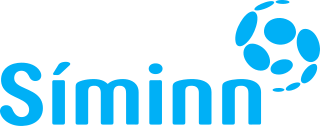
Communications in Belgium are extensive and advanced. Belgium possesses the infrastructure for both mobile and land-based telecom, as well as having significant television, radio and internet infrastructure. The country code for Belgium is BE.
Egypt has long been the cultural and informational centre of the Middle East and North Africa, and Cairo is the region's largest publishing and broadcasting centre.
Telecommunications in France are highly developed. France is served by an extensive system of automatic telephone exchanges connected by modern networks of fiber-optic cable, coaxial cable, microwave radio relay, and a domestic satellite system; cellular telephone service is widely available, expanding rapidly, and includes roaming service to foreign countries.

Telecommunications in Ghana include radio, television, fixed and mobile telephones, and the Internet.
The most important telecommunications in Italy are telephone, radio, television and the Internet.
Telecommunications in Kuwait provides information about the telephone, Internet, radio, and television infrastructure in Kuwait.
Telephones - main lines in use: 300,500 (2024)
The People's Republic of China possesses a diversified communications system that links all parts of the country by Internet, telephone, telegraph, radio, and television. The country is served by an extensive system of automatic telephone exchanges connected by modern networks of fiber-optic cable, coaxial cable, microwave radio relay, and a domestic satellite system; cellular telephone service is widely available, expanding rapidly, and includes roaming service to foreign countries. Fiber to the x infrastructure has been expanded rapidly in recent years.
Telecommunications in Saudi Arabia have evolved early in the Kingdom since the establishment the Directorate of Post, Telephone and Telegraph (PTT) in 1926.
Telecommunications in Tanzania include radio, television, fixed and mobile telephones, and the Internet available in mainland Tanzania and the semiautonomous Zanzibar archipelago.
Telecommunications in Albania include radio, television, fixed and mobile telephones, and the Internet.
There are a number of systems of communication in Uganda, including a system of telephony, radio and television broadcasts, internet, mail, and several newspapers. The use of phones and the internet in Uganda has rapidly increased in the last few years.
Portugal has a modern and flexible telecommunications market and a wide range of varied media organisations. The regulatory body overseeing communications is called ANACOM.
Telecommunications in Iceland is a diversified market. Iceland has a highly developed telecommunications sector with modern infrastructure. Multiple wholesale and retail providers are operated in a competitive market. As of 2024, Iceland's telecom infrastructure is fully digitised and mostly fibre based, with 93% of households having full-fibre availability. Landlines are based on VoIP technology. Mobile telecoms in Iceland adheres to the GSM standard and 2G, 3G, 4G and 5G services are available, as well as a TETRA network for emergency communications. Iceland is connected by four submarine cables to both Europe and North America. Broadcasting is based on DVB-T2 standard for television and FM for radio. There are a few printed newspapers, although most mass media is consumed online. Postal service is provided under universal obligation by the state-owned Iceland Post, but other private postal companies also operate.

Hellenic Telecommunications Organisation S.A. is the largest technology company in Greece. It is one of the three largest companies listed in the Athens Stock Exchange, according to market capitalization.

Síminn hf., previously named Landssíminn and Póstur og Sími, is an Icelandic telecommunications company. It offers communication services for both private and corporate clients, including mobile (2G/3G/4G/5G), landline (VoIP/POTS), Internet (ADSL/VDSL/FTTH) and IPTV services. Síminn also operates multiple TV channels and streaming services. Síminn is listed on the Icelandic stock exchange.
Internet in Greece reached an 82% usage rate among individuals in 2022, yet it slightly trails behind the European Union averages in digital skills among individuals aged 16-74, as highlighted in the European Commission's Digital Decade Country Report 2023. In an effort to bridge this gap and enhance digital proficiency across the nation, Greece implemented the "Works Again" law in April 2022. This law is designed to modernize the Public Employment Service, aligning it more closely with the demands of the labor market and vocational training needs. Additionally, Greece has launched a strategic initiative for Vocational Education and Training (VET) and lifelong learning. This initiative aims to revamp educational curricula to include digital and green skills.
Telecommunications in Djibouti falls under the authority of the Ministry of Communication & Culture.
Telecommunications in Ivory Coast include radio, television, fixed and mobile telephones, and the Internet.
Telecommunications in Cyprus includes radio, television, fixed and mobile telephones, and the Internet, in the Republic of Cyprus.





